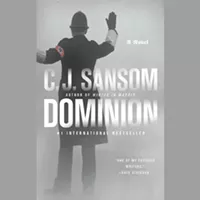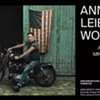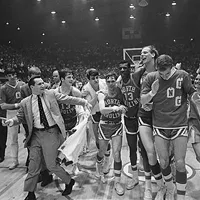It's no surprise that Salman Rushdie's two-day visit to Davidson College last week felt at once miraculous and mundane. His novels, after all, juxtapose those two qualities, offering delirious deliberations on everything from cultural assimilation and religious doctrine to advertising jingles and vainglorious actors. His appearance here represented the typical (an eminent author discoursing on his art) and the atypical (said eminence being the most influential writer of the past 25 years).
In 1998, the Iranian government ended the fatwa, or religious edict, which had been launched against Rushdie by the Ayatollah Khomeini for perceived blasphemous passages in The Satanic Verses. Since then, Rushdie, 57, has mostly lived in New York City. Despite the fatwa's end, Rushdie must live with the knowledge that, at any given time, a zealot may make good on the long-dead ayatollah's order. The saga of the Khomeini fatwa is, sadly, the first thing most people think of when they think of Rushdie. Even those of us who savor his punning linguistics and virtuosic satire find it hard to banish the death sentence once and for all.
Such baggage makes it all the more surprising when Rushdie, in a gray blazer and slacks, makes his way down the stairs of Davidson's Carnegie Guest House on a sunny, cold winter afternoon. Shorn of his familiar beard, Rushdie looks a bit thinner in the face, but otherwise betrays few signs of being anything other than an upper middle class man with both common joys and sorrows.
When he makes it into a downstairs room stocked with a dozen or so sitting-room chairs and large windows, Rushdie confronts a motley crew of depressingly few local journalists. Two TV news crews, a Davidson student newspaper writer, the book editor from the Charlotte Observer, a writer and photographer from the Statesville Record & Landmark — and me — form the entire press corps for a man who is all but assured a future Nobel Prize in literature.
Reluctant political novelist
If Rushdie is disappointed or uncomfortable
in any way, it's not evident, as he responds with a smile to a question of why
he would agree to visit Davidson. "Well, why not, really?"
It is emblematic of his reputation — and a lengthy distrust of religious fanaticism running through many of his novels — that the first two questions Rushdie fields are tied to the Middle East and international politics rather than magical realism or plot technique.
Rushdie grew up Muslim in Bombay, but did not come from an especially religious family. Moreover, as Muslims are not the dominant religious group in India, he was surrounded by people of many faiths throughout childhood: Christian, Sikh, Farsi and so on. In each case, feasts and ceremonies were celebrated across all faiths. Or, as Rushdie now explains the cross-pollinating of religious rituals, "It was just more holidays."
With so much and such varied religion around, Rushdie says it all had an odd secularizing effect. He's never been very religious, nor is he now. Instead, he preaches what Salon.com once described as "secular humanism."
Churches and faith worry Rushdie because, he believes, they too often lead to limitation of thought and expression. He is best known for critiquing Islamic fundamentalism, but he lets no one off the hook, including the influential, and rigid, conservative Christian movement in this country.
Iran, he says, is a perfect example of religion run amok. "The sad thing is if there were an election in Iran, there's no doubt the (ruling religious) regime would be voted out. And there's no doubt Iran seems to be going the wrong way."
Despite that nation's hard-line government, Rushdie sees some cause for optimism in Iran's swelling youth population, which has nothing invested in the current Islamic government. Sooner or later, he says, Iran's religious regime will falter, toppled by that younger generation's mounting disdain.
Lest so much geopolitical talk grow burdensome, the novelist lightens the mood. "I'm not a fan of the Iranian state," he says. "I've had some trouble with it myself."
Bush league
Although The Satanic Verses is as much, or more, concerned with the plight
of the immigrant and the feeling of otherness, its contempt for fundamentalism
and repressive societies seems especially prescient in the wake of 9/11 and
the current, oft-bungled war on terrorism.
The ayatollah's subsequent valentine — the fatwa was issued February 14, 1989 — brought terrorism to Rushdie's door. Fellow Eastern diaspora writer V.S. Naipaul once described Rushdie's plight as "an extreme form of literary criticism."
Several years after he moved to New York from London, Rushdie glimpsed terror on an epic scale as the World Trade Center bombings unfolded.
It gave him one of the most unique vantage points for assessing Western fears and, in particular, the reaction of Americans attacked on their own soil for the first time since Pearl Harbor.
Latest in Books
More by Erik Spanberg
-

Book review: Natchez Burning
Jul 2, 2014 -

Book review: Dominion
May 16, 2014 -

Book review: Wiley Cash's This Dark Road to Mercy
Mar 21, 2014 - More »
Calendar
-

ANNIE LEIBOVITZ / WORK @ Mint Museum Uptown at Levine Center for the Arts
-

Trap & Paint + Music Bingo @ Blush CLT
-

Trap & Paint (Hookah Edition) @ Blush CLT
-

BookTok Sensation RC Luna Comes to Charlotte – Author Signing Event @ The Trope Bookshop
- Sat., Aug. 30, 11 a.m.-1 p.m.
-

R&B Sip & Paint + Comedy Show @ Blush CLT
-
Jeff Jackson's New Book Kills Rock Stars 1
Gimme danger
-
Janelle Dunlap Takes a Temporal Look at Afrofuturism with Time Camp 002
Reclaiming her time
-
'Hamilton' Arrives This Week, Lifting Local Artists or Eclipsing Them?
Follow the money










